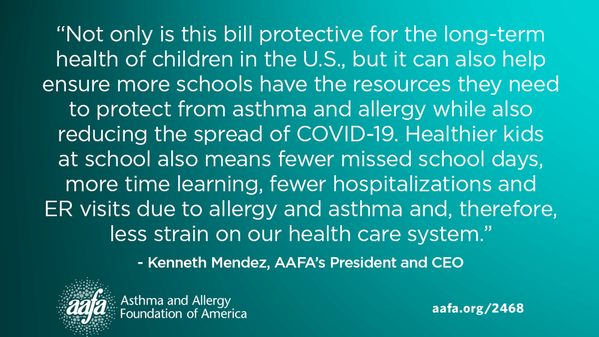New legislation helps states protect students with asthma and allergies nationwide
Washington, D.C., Jan. 5, 2021 — Today the president signed H.R. 2468, the School-Based Allergies and Asthma Management Program Act into law. This bipartisan legislation will help millions of U.S. children manage asthma and food allergies at school. The Asthma and Allergy Foundation of America (AAFA) is proud to have led the charge on the bill from the beginning.
H.R. 2468 encourages states to improve allergy and asthma care in schools by giving preference for federal grants to states that adopt certain management programs and policies. The policy recommendations are in keeping with AAFA's State Honor Roll. To recap, states can earn financial rewards for putting the following in place:
- Methods to identify all students who have allergies or asthma
- Create individual student action plans
- Require school nurses or on-site trained staff during operating hours to administer medicines for both asthma and allergies
- Asthma and allergy training education for school staff
- Efforts to reduce indoor asthma and allergy triggers
- Coordinate management of care with families and health care providers
“We’re thrilled to see a top policy priority AAFA’s been working on for years with Congress become law. This legislation will help achieve long-term health goals inside of schools. It will also help bridge health and achievement gaps by race. Asthma is more common in Black and Hispanic children leading to more missed school days compared to their white classmates. Healthier school environments mean improved outcomes and more time learning,” said AAFA’s CEO and president, Kenneth Mendez. “This legislation also comes at a time schools are balancing academics with managing a pandemic. With all of the inequities COVID-19 has laid bare, policy that can only boost the health and safety of students and teachers is coming during a time when we need it most.”
According to the Centers for Disease Control, about 6 million U.S. children have asthma. An estimated 5.6 million suffer from food allergies, or a combination of both food allergies and asthma. Poorly controlled asthma and severe allergic reactions can be fatal. Asthma is currently the most common chronic disease among children. It is the leading cause of missed school days for students under age 18.
We’re grateful to our colleagues at the American Academy of Allergy, Asthma & Immunology (AAAAI) for their tireless work on this. H.R. 2468 is based on AAAAI’s Asthma, Allergy & Anaphylaxis Management Program, also known as SA(3)MPRO™. AAFA is happy to have collaborated on and endorsed SA(3)MPRO™.
AAFA would also like to once again extend thanks to House Majority Leader Steny Hoyer (D-MD) and Representative Phil Roe (R-TN) for their unwavering leadership on the bill and Senator Lamar Alexander (R-TN) for moving H.R. 2468 through the Senate.
Our patient and family community also played a major role in making this happen. AAFA’s grassroots efforts led thousands of families who are impacted by asthma and allergies across the nation to get involved and contact their legislators. Community members can continue to support AAFA’s advocacy work with a secure donation here: AAFA Advocacy For School Health


Comments (2)